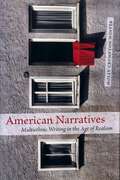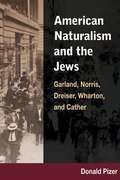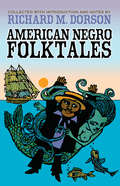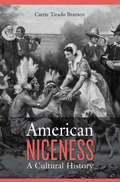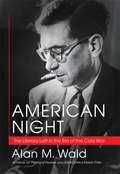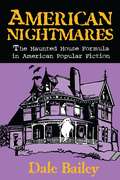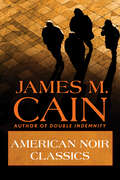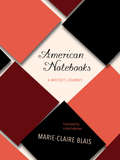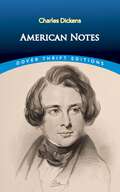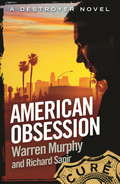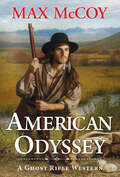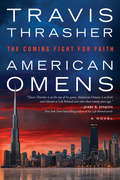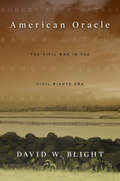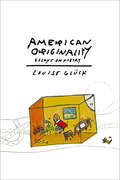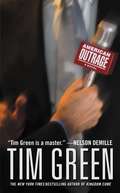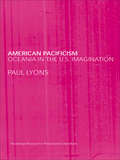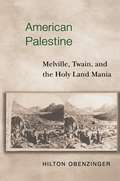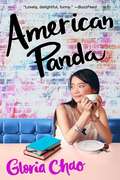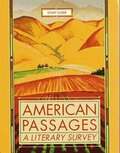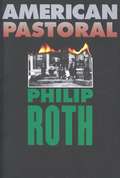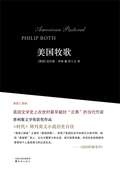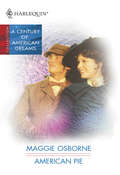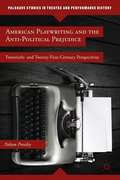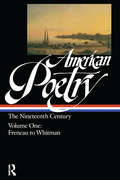- Table View
- List View
American Narratives: Multiethnic Writing in the Age of Realism
by Margaret Crumpton WinterAmerican Narratives takes readers back to the turn of the twentieth century to reintroduce four writers of varying ethnic backgrounds whose works were mostly ignored by critics of their day. With the skill of a literary detective, Molly Crumpton Winter recovers an early multicultural discourse on assimilation and national belonging that has been largely overlooked by literary scholars. At the heart of the book are close readings of works by four nearly forgotten artists from 1890 to 1915, the era often termed the age of realism: Mary Antin, a Jewish American immigrant from Russia; Zitkala- a, a Sioux woman originally from South Dakota; Sutton E. Griggs, an African American from the South; and Sui Sin Far, a biracial, Chinese American female writer who lived on the West Coast. Winter's treatment of Antin's The Promised Land serves as an occasion for a reexamination of the concept of assimilation in American literature, and the chapter on Zitkala- a is the most comprehensive analysis of her narratives to date. Winter argues persuasively that Griggs should have long been a more visible presence in American literary history, and the exploration of Sui Sin Far reveals her to be the embodiment of the varied and unpredictable ways that diversity of cultures came together in America.In American Narratives, Winter maintains that the writings of these four rediscovered authors, with their emphasis on issues of ethnicity, identity, and nationality, fit squarely in the American realist tradition. She also establishes a multiethnic dialogue among these writers, demonstrating ways in which cultural identity and national belonging are peristently contested in this literature.
American Naturalism and the Jews: Garland, Norris, Dreiser, Wharton, and Cather
by Donald PizerAmerican Naturalism and the Jews examines the unabashed anti-Semitism of five notable American naturalist novelists otherwise known for their progressive social values. Hamlin Garland, Frank Norris, and Theodore Dreiser all pushed for social improvements for the poor and oppressed, while Edith Wharton and Willa Cather both advanced the public status of women. But they all also expressed strong prejudices against the Jewish race and faith throughout their fiction, essays, letters, and other writings, producing a contradiction in American literary history that has stymied scholars and, until now, gone largely unexamined. In this breakthrough study, Donald Pizer confronts this disconcerting strain of anti-Semitism pervading American letters and culture, illustrating how easily prejudice can coexist with even the most progressive ideals. Pizer shows how these writers' racist impulses represented more than just personal biases, but resonated with larger social and ideological movements within American culture. Anti-Semitic sentiment motivated such various movements as the western farmers' populist revolt and the East Coast patricians' revulsion against immigration, both of which Pizer discusses here. This antagonism toward Jews and other non-Anglo-Saxon ethnicities intersected not only with these authors' social reform agendas but also with their literary method of representing the overpowering forces of heredity, social or natural environment, and savage instinct.
American Negro Folktales
by Richard M. DorsonA preacher battles a bear, a mother returns from the dead, and a clever servant conducts a Big Feet Contest in this rich anthology of African-American folklore. Scores of humorous and harrowing stories, collected during the mid-twentieth century, tell of talking animals, ghosts, devils, and saints.The first part of the book provides a setting for the fables, in which folklorist Richard M. Dorson discusses their origins and the artistry of storytellers. The second part consists of the tales, which include the adventures of Old Marster and John, supernatural episodes, and comical and satirical anecdotes as well as more realistic accounts of racial injustice. Recounted in the actual words of the narrators, the folktales abound in bold language, memorable imagery, and bittersweet humor that reflect the essence of African-American storytelling traditions.
American Niceness: A Cultural History
by Carrie Tirado BramenThe cliché of the Ugly American—loud, vulgar, materialistic, chauvinistic—still expresses what people around the world dislike about their Yankee counterparts. Carrie Tirado Bramen recovers the history of a different national archetype—the nice American—which has been central to ideas of American identity since the nineteenth century.
American Night
by Alan M. WaldAmerican Night, the final volume of an unprecedented trilogy, brings Alan Wald's multigenerational history of Communist writers to a poignant climax. Using new research to explore the intimate lives of novelists, poets, and critics during the Cold War, Wald reveals a radical community longing for the rebirth of the social vision of the 1930s and struggling with a loss of moral certainty as the Communist worldview was being called into question. The resulting literature, Wald shows, is a haunting record of fracture and struggle linked by common structures of feeling, ones more suggestive of the "negative dialectics" of Theodor Adorno than the traditional social realism of the Left. Establishing new points of contact among Kenneth Fearing, Ann Petry, Alexander Saxton, Richard Wright, Jo Sinclair, Thomas McGrath, and Carlos Bulosan, Wald argues that these writers were in dialogue with psychoanalysis, existentialism, and postwar modernism, often generating moods of piercing emotional acuity and cosmic dissent. He also recounts the contributions of lesser known cultural workers, with a unique accent on gays and lesbians, secular Jews, and people of color. The vexing ambiguities of an era Wald labels "late antifascism" serve to frame an impressive collective biography.
American Nightmares: The Haunted House Formula in American Popular Fiction
by Dale BaileyWhen Edgar Allan Poe set down the tale of the accursed House of Usher in 1839, he also laid the foundation for a literary tradition that has assumed a lasting role in American culture. "The House of Usher" and its literary progeny have not lacked for tenants in the century and a half since: writers from Nathaniel Hawthorne to Stephen King have taken rooms in the haunted houses of American fiction. Dale Bailey traces the haunted house tale from its origins in English gothic fiction to the paperback potboilers of the present, highlighting the unique significance of the house in the domestic, economic, and social ideologies of our nation. The author concludes that the haunted house has become a powerful and profoundly subversive symbol of everything that has gone nightmarishly awry in the American Dream.
American Noir Classics
by James M. CainA collection of hardboiled crime fiction from the author of Double Indemnity, “one of the greats of American noir” (The Guardian). They call him Lucky—but he’s never had a lucky day in his life. A nineteen-year-old hobo just starting to ride the rails, he is hiding in the coal car when the railroad detective comes through. They get into a scuffle, and Lucky’s hand finds a railroad spike. . . .“Dead Man” is just one of the outstanding stories in this collection by the author renowned for insightful and exciting crime stories. Hailed as a “poet of the tabloid murder” by legendary critic Edmund Wilson and a Mystery Writers of America Grand Master, James M. Cain, understood fear in all its forms—and knew better than anyone the terror of a killer on the run. This volume includes:“The Baby in the Icebox” • “Pay-Off Girl” • “Two o’Clock Blonde” • “The Birthday Party” * “Brush Fire” • “Coal Black” • “Career in C Major” • “Death on the Beach” • “Dead Man” • “The Girl in the Storm” • “Joy Ride to Glory” • “Pastorale” • “Mommy’s a Barfly” • “The Taking of Montfaucon” • “Cigarette Girl” • “The Robbery” • “Blackmail”
American Notebooks: A Writer's Journey
by Marie-Claire BlaisIt is the spring of 1963. The young Quebec author Marie-Claire Blais, bursting with energy and talent, has just won a coveted Guggenheim fellowship. She chooses Cambridge, Massachusetts, as the place where she will begin her writer's apprenticeship with her mentor, Edmund Wilson. American Notebooks is much more than a fascinating autobiographical account of the intellectual flowering of a great writer. An album of exquisitely drawn literary portraits of companions, intellectuals, writers, musicians, artists and social activists of the period--Edmund and Elena Wilson; Mary Meigs; Maud Maugan; Barbara Deming; Truman Capote; Jacques Hébert, her first Quebec publisher, then senator; and many others--it also introduces many of the real life personalities who have inspired her fictional characters.
American Notes: Digital Reprint Of 1895 International Book Co. Edition (Dover Thrift Editions)
by Charles Dickens"This is not the republic of my imagination," Charles Dickens noted ruefully of his 1842 visit to the United States. His American Notes forms a stinging reproof of the country's embrace of slavery, its corrupt press and woeful sanitary conditions, and its citizens' offensive manners. Written with the author's customary observational powers and incisive wit, this volume offers a fascinating glimpse of 19th-century America. Dickens was not entirely hostile toward his hosts, and as a dedicated social reformer he took particular interest in whether American democracy constituted an advance over the class divisions of Victorian England. The author toured jails, hospitals, and courts of law, which he praised heartily. Traveling by steamship, coach, and rail, he visited New York, Philadelphia, Boston, and Washington, D. C., among other cities, and his utter astonishment at the natural grandeur of Niagara Falls marks a highlight of his travelogue. This trenchant satire of America and Americans is certain to delight both Dickens enthusiasts and history buffs.
American Obsession: Number 109 in Series (The Destroyer #109)
by Warren Murphy Richard SapirThe new body culture is finally bringing its rewards, thanks to a hormone treatment that rapidly restructures body fat to muscle, all overnight, during a true beauty snooze.But it's way-out expensive, and only the rich and famous can indulge. After all, what's a thousand bucks a day when the result is a body to die for?There are some side effects - no pain, no gain! But when innocent people start paying a steep price for the stars' self-improvement regimens, CURE's Dr. Smith sends Remo and Chiun to infiltrate the Lycra crowd and the hallowed halls of the legalized drug trade. Soon their investigation is blocked by a greedy corporation, but the worst challenge is from an army of celebrities - lean, mean products of a killer diet....Breathlessly action-packed and boasting a winning combination of thrills, humour and mysticism, the Destroyer is one of the bestselling series of all time.
American Odyssey (A Ghost Rifle Western #2)
by Max McCoyMax McCoy, the Spur Award-winning author of Damnation Road, continues his American Western saga of the Ghost Rifle as the violence and bloodshed the weapon caused return to haunt the man who created it . . .THE WEAPON AND THE WILDERNESS Ten years have passed since Jack Picaro lost his Ghost Rifle—the firearm he invented, the one that never missed its target. The loss of the rifle calmed the hellraiser in his soul. Instead of returning to the gambling halls and whiskey bars of St. Louis, Jack has spent the last decade as a fur trapper in Wyoming&’s Wild River Range, married to Sky, the daughter of an Arikara war chief. Then, after helping rescue U.S. soldiers captured by Crow Indians in the Rocky Mountains, Jack hears the familiar bell-like report of his Ghost Rifle. Determined to retrieve his deadly property, he travels deep into Lakota territory, facing down old enemies—and resuming old sinful habits—unaware of what awaits him when he eventually returns home to his family.&“Few Western writers today can spin a tale with style, wit, and rawness better than Max McCoy.&”—Johnny D. Boggs, Western Heritage and Spur Award-winning author of West Texas Kill
American Omens: The Coming Fight for Faith: A Novel
by Travis ThrasherIn this taut thriller that depicts a future where belief is dangerous, faith is deemed hatred, and a group of powerful elite keeps watch, the Reckoner has come to wake up America.The year is 2038 and Cheyenne Burne is a brilliant young programmer working for Acatour, the world's top technology firm. Her father converts to Christianity, and he suddenly disappears without a trace. When a stranger hands Cheyenne a coded message that sends her on a collision course with a clandestine group of believers, she must put her life in the hands of those following a man known only as the Reckoner. He claims he wants to bring back true faith in Christ to America and also reveal the forces behind the disappearances of the many renowned people who publicly declared their Christian faith. Operating in the shadows and living off the grid, this mysterious prophet assembles a ragtag team--including a former bookseller whose store was shut down for selling prohibited books--to help him take the battle for transparency to the top. With a ruthless FBI agent closing in, can Cheyenne and the others expose the truth and lead a return to God in America before it's too late?
American Oracle: The Civil War in the Civil Rights Era
by David W. Blight“The ghosts of the Civil War never leave us, as David Blight knows perhaps better than anyone, and in this superb book he masterfully unites two distant but inextricably bound events.”―Ken Burns Standing on the steps of the Lincoln Memorial on August 28, 1963, a century after the signing of the Emancipation Proclamation, Martin Luther King, Jr., declared, “One hundred years later, the Negro still is not free.” He delivered this speech just three years after the Virginia Civil War Commission published a guide proclaiming that “the Centennial is no time for finding fault or placing blame or fighting the issues all over again.” David Blight takes his readers back to the centennial celebration to determine how Americans then made sense of the suffering, loss, and liberation that had wracked the United States a century earlier. Amid cold war politics and civil rights protest, four of America’s most incisive writers explored the gulf between remembrance and reality. Robert Penn Warren, the southern-reared poet-novelist who recanted his support of segregation; Bruce Catton, the journalist and U.S. Navy officer who became a popular Civil War historian; Edmund Wilson, the century’s preeminent literary critic; and James Baldwin, the searing African-American essayist and activist—each exposed America’s triumphalist memory of the war. And each, in his own way, demanded a reckoning with the tragic consequences it spawned. Blight illuminates not only mid-twentieth-century America’s sense of itself but also the dynamic, ever-changing nature of Civil War memory. On the eve of the 150th anniversary of the war, we have an invaluable perspective on how this conflict continues to shape the country’s political debates, national identity, and sense of purpose.
American Originality: Essays on Poetry
by Louise GlückA luminous collection of essays from one of our most original and influential poets Five decades after her debut poetry collection, Firstborn, Louise Glück is a towering figure in American letters. Written with the same probing, analytic control that has long distinguished her poetry, American Originality is Glück’s second book of essays—her first, Proofs and Theories, won the 1993 PEN/Martha Albrand Award for First Nonfiction. Glück’s moving and disabusing lyricism is on full display in this decisive new collection. From its opening pages, American Originality forces readers to consider contemporary poetry and its demigods in radical, unconsoling, and ultimately very productive ways. Determined to wrest ample, often contradictory meaning from our current literary discourse, Glück comprehends and destabilizes notions of “narcissism” and “genius” that are unique to the American literary climate. This includes erudite analyses of the poets who have interested her throughout her own career, such as Rilke, Pinsky, Chiasson, and Dobyns, and introductions to the first books of poets like Dana Levin, Peter Streckfus, Spencer Reece, and Richard Siken. Forceful, revealing, challenging, and instructive, American Originality is a seminal critical achievement.
American Outrage
by Tim GreenJake Carlson, a correspondent for the TV news show AMERICAN OUTRAGE, inhabits a world of sensational trials and crazed celebrities. One of the nation's top journalists, he's used to dragging himself into the dirt to get the truth. When his adopted son Sam asks him to use his muckraking talents to find his birth mother, Jake is stunned by the ugly secrets he uncovers: an international crime syndicate, a horrifying child trafficking ring, and a corrupt politician, the patriarch of an old New York financial dynasty. Initially galvanized by a career-making story, Jake---and his son---are soon the victims of brutal violence and the targets of Jake's fellow reporters, who dog them for their story. Concerned for the survival of his family, Jake realizes some sins of the past should never be uncovered...
American Pacificism: Oceania in the U.S. Imagination (Routledge Research in Postcolonial Literatures)
by Paul LyonsThis provocative analysis and critique of American representations of Oceania and Oceanians from the nineteenth century to the present, argues that imperial fantasies have glossed over a complex, violent history. It introduces the concept of ‘American Pacificism’, a theoretical framework that draws on contemporary theories of friendship, hospitality and tourism to refigure established debates around ‘orientalism’ for an Oceanian context. Paul Lyons explores American-Islander relations and traces the ways in which two fundamental conceptions of Oceania have been entwined in the American imagination. On the one hand, the Pacific islands are seen as economic and geopolitical ‘stepping stones’, rather than ends in themselves, whilst on the other they are viewed as ends of the earth or ‘cultural limits’, unencumbered by notions of sin, antitheses to the industrial worlds of economic and political modernity. However, both conceptions obscure not only Islander cultures, but also innovative responses to incursion. The islands instead emerge in relation to American national identity, as places for scientific discovery, soul-saving and civilizing missions, manhood-testing adventure, nuclear testing and eroticized furloughs between maritime work and warfare. Ranging from first contact and the colonial archive through to postcolonialism and global tourism, this thought-provoking volume draws upon a wide, rewarding collection of literary works, historical and cultural scholarship, government documents and tourist literature.
American Palestine: Melville, Twain, and the Holy Land Mania
by Hilton ObenzingerIn the nineteenth century, American tourists, scholars, evangelists, writers, and artists flocked to Palestine as part of a "Holy Land mania." Many saw America as a New Israel, a modern nation chosen to do God's work on Earth, and produced a rich variety of inspirational art and literature about their travels in the original promised land, which was then part of Ottoman-controlled Palestine. In American Palestine, Hilton Obenzinger explores two "infidel texts" in this tradition: Herman Melville's Clarel: A Poem and Pilgrimage to the Holy Land (1876) and Mark Twain's The Innocents Abroad: or, The New Pilgrims' Progress (1869). As he shows, these works undermined in very different ways conventional assumptions about America's divine mission. In the darkly philosophical Clarel, Melville found echoes of Palestine's apparent desolation and ruin in his own spiritual doubts and in America's materialism and corruption. Twain's satiric travelogue, by contrast, mocked the romantic naiveté of Americans abroad, noting the incongruity of a "fantastic mob" of "Yanks" in the Holy Land and contrasting their exalted notions of Palestine with its prosaic reality. Obenzinger demonstrates, however, that Melville and Twain nevertheless shared many colonialist and orientalist assumptions of the day, revealed most clearly in their ideas about Arabs, Jews, and Native Americans. Combining keen literary and historical insights and careful attention to the context of other American writings about Palestine, this book throws new light on the construction of American identity in the nineteenth century.
American Panda
by Gloria Chao&“Weepingly funny.&” —The Wall Street Journal &“Delightful.&” —BuzzFeed &“Charmed my socks off.&” —David Arnold, New York Times bestselling author of Kids of Appetite and Mosquitoland Four starred reviews for this incisive, laugh-out-loud contemporary debut about a Taiwanese American teen whose parents want her to be a doctor and marry a Taiwanese Ivy Leaguer despite her squeamishness with germs and crush on a Japanese classmate.At seventeen, Mei should be in high school, but skipping fourth grade was part of her parents&’ master plan. Now a freshman at MIT, she is on track to fulfill the rest of this predetermined future: become a doctor, marry a preapproved Taiwanese Ivy Leaguer, produce a litter of babies. With everything her parents have sacrificed to make her cushy life a reality, Mei can&’t bring herself to tell them the truth—that she (1) hates germs, (2) falls asleep in biology lectures, and (3) has a crush on her classmate Darren Takahashi, who is decidedly not Taiwanese. But when Mei reconnects with her brother, Xing, who is estranged from the family for dating the wrong woman, Mei starts to wonder if all the secrets are truly worth it. Can she find a way to be herself, whoever that is, before her web of lies unravels? From debut author Gloria Chao comes a hilarious, heartfelt tale of how, unlike the panda, life isn&’t always so black and white.
American Pastoral (American Trilogy #1)
by Philip RothAmerican Pastoral is the story of a fortunate American's rise and fall - of a strong, confident master of social equilibrium overwhelmed by the forces of social disorder. Seymour "Swede" Levov - a legendary high school athlete, a devoted family man, a hard worker, the prosperous inheritor of his father's Newark glove factory - comes of age in thriving, triumphant postwar America. But everything he loves is lost when the country begins to run amok in the turbulent 1960s. Not even the most private, well-intentioned citizen, it seems, gets to sidestep the sweep of history. With vigorous realism, Roth takes us back to the conflicts and violent transitions of the 1960s. This is a book about loving - and hating - America. It's a book about wanting to belong - and refusing to belong - to America. It sets the desire for an American pastoral - a respectable life of space, calm, order, optimism, and achievement - against the indigenous American Berserk.
American Pastoral (Mandarin Edition)
by Philip RothIt is an elegy for all our century's promises of prosperity, civic order, and domestic bliss. Swede Levov, a legendary athlete at his Newark high school, who grows up in the booming postwar years to marry a former Miss New Jersey, inherit his father's glove factory, and move into a stone house in the idyllic hamlet of Old Rimrock. And then one day in 1968, Swede's beautiful American luck deserts him. "美国三部曲"之首的 美国牧歌 体现了美国社会中由来已久的冲突 相信"美国梦"的人 以为只要努力和正派 就可美梦成真 然而历史的悲剧性常常和个人是否努力和正派无关
American Pie
by Maggie OsborneFrom rags to riches… The American Dream Spirited Polish immigrant Lucie Kolska and Dublin native Jamie Kelly arrive on Ellis Island the same day. Lucie is instantly drawn to Jamie and his daring dreams of success. Lucie, too, has hopes of her own…tucked away in the corner of her suitcase. The family formula for beauty cream. Work is scarce, the tenements teeming—and bitter family rivalries keep Lucie and Jamie apart…until Lucie’s menial job in a Madison Avenue mansion connects her with New York’s elite—and an opportunity to build a beauty empire. Now, more than ever, she needs Jamie’s love—his passion—to make their American Dream come true.
American Playwriting and the Anti-Political Prejudice
by Nelson PressleyTwenty years after Tony Kushner's influential Angels in America seemed to declare a revitalized potency for the popular political play, there is a "No Politics" prejudice undermining US production and writing. This book explores the largely unrecognized cultural patterns that discourage political playwriting on the contemporary American stage.
American Poetic Materialism from Whitman to Stevens
by Mark NobleIn American Poetic Materialism from Whitman to Stevens, Mark Noble examines writers who rethink the human in material terms. Do our experiences correlate to our material elements? Do visions of a common physical ground imply a common purpose? Noble proposes new readings of Walt Whitman, Ralph Waldo Emerson, William James, George Santayana and Wallace Stevens that explore a literary history wrestling with the consequences of its own materialism. At a moment when several new models of the relationship between human experience and its physical ground circulate among critical theorists and philosophers of science, this book turns to poets who have long asked what our shared materiality can tell us about our prospects for new models of our material selves.
American Poetry 19th Century 2: The Library Of America Anthology (Library Of America: The American Poetry Anthology Ser.the\library Of America #2)
by John HollanderFirst Published in 2004. Routledge is an imprint of Taylor & Francis, an informa company.
